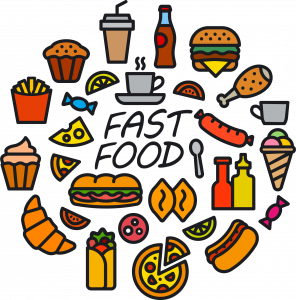Nutrition and mental health:
The importance of diet in depression
Over recent years, research has been uncovering the link between nutrition and mental health. One area of focus has been the importance of diet in depression. For people already living with a disability or mental health issue, this link is especially vital to understand – and use to support improved wellbeing.
Australian statistics show an estimated 36 percent of people with severe or profound disability report having mood disorders such as depression, compared to 8.7 percent of people without disability[i]. Significantly, figures also show that mental illnesses are the biggest single cause of disability in Australia[ii]. If you have a disability or a mental health problem, looking at your diet can be one of the best ways to do something positive for your mental (and physical) health and wellbeing.

Which came first: Diet or depression?
When it comes to exploring nutrition and mental health, it can be difficult for researchers to tease out whether poor diet increases the risk of depression, or whether depression leads to poor eating choices. It seems both are true.
Studies have observed that people who stick to a healthy or Mediterranean-style diet – eating a lot of vegetables, fruits, nuts, and legumes; moderate amounts of eggs, poultry, and dairy products; and only occasionally eating red meat – have a lower risk for depression[iii]. On the other side of the nutrition and mental health equation, low mood can lead to less healthy food choices. For example, you might eat comfort foods such as chips or chocolate when you’re feeling depressed. For people taking psychiatric medications, these can cause changes to your appetite.
Either way, moving towards a more nutritious diet can only help you feel better – mentally and physically.
What should I eat to boost my mental health?
There’s no such thing as a diet that will ‘cure’ depression. However, you can make changes that support mental health. In fact, a 2017 study published in BMC Medicine concluded that dietary improvement may provide an effective and accessible treatment strategy for managing depression, with benefits that could extend to managing common co-morbidities[iv].
The researchers randomly divided 67 study participants diagnosed with moderate to severe depression into two groups. One group received seven individual nutritional consulting sessions with a clinical dietician. The other received seven equivalent social support sessions. At 12 weeks, the dietary support group showed significantly greater improvement on a depression rating scale.
In this study, the dietary group were supported to stick as closely as possible to a diet based on the Australian Dietary Guidelines and the Dietary Guidelines for Adults in Greece. In a nutshell, this involved eating from some key food groups:
whole grains (5–8 serves per day)
- vegetables (6 per day)
- fruit (3 per day),
- legumes (3–4 per week
- low-fat and unsweetened dairy foods (2–3 per day)
- raw and unsalted nuts (1 per day)
- fish (at least 2 per week)
- lean red meats (3–4 per week)
- chicken (2–3 per week)
- eggs (up to 6 per week)olive oil (3 tablespoons per day).
It also involved cutting back on ‘discretionary’ foods, such as fried foods, sugary drinks, sweets and fast foods. Following a nutritious diet similar to this gives you the best chance of boosting your physical and mental wellbeing.
As part of a diet that’s nutritious overall, certain nutrients may also be associated with mood. These include:
Vitamin D
Studies have suggested low vitamin D levels are linked with depression. Studies using vitamin D to manage depression show there may be an effect, but more research is needed[v]. Sunlight exposure is the best source of vitamin D, but it’s also contained in oily fish, eggs, beef liver, fortified dairy products, and supplements.
Zinc
Supplements of the mineral zinc also appear to help when taken with an antidepressant, but not when taken alone[ix]. More high-quality research is needed.
B Vitamins
There is some evidence that certain B-group vitamins may play a role in managing depression. For example, in one high-quality study, adult participants with depression received either 300mg of thiamine (vitamin B1) or placebo pills for 12 weeks (along with their anti-depressant medication). The group taking thiamine showed a greater reduction in depression symptoms, although it’s unknown whether they were thiamine deficient at the start of the study[vi].
Other studies have shown promising results using vitamin B6 to help women with hormone-related depression[vii]. More research on B-group vitamins is needed to clarify their role in managing depression symptoms.
Omega-3 fatty acids
The two main types of omega-3 fatty acids are eicosapentaenoic acid (EPA) and docosahexaenoic acid (DHA). These are commonly found in fish oil supplements. An analysis of 35 studies found that EPA seems to be the important ingredient in helping depression. Supplements containing more than 50 per cent EPA were found to improve depression more than placebo, whereas those containing more than 50 per cent DHA had no effect[viii]. More research is needed to confirm these findings.
As well as in supplements, EPA and DHA are found in oily fish such a salmon, tuna, mackerel and sardines. It can also be made in the body from oil found in foods like flaxseed, walnuts and canola oil.
What foods should I avoid?
With regards to the importance of diet in depression, what you avoid can be as critical as what you eat and drink.
Alcohol, for example, is a depressant and heavy long-term drinking may lead to depression.
It may therefore be helpful to avoid drinking alcohol if you’re feeling depressed[x].
A high intake of fast foods and refined foods has also been linked with depression risk.
In one study published in 2011, a higher risk of depression was associated with
greater consumption of fast foods[xi].Another analysis published in 2020 concluded
that intake of fast and fried foods was related to increased risk of depression and stress[xii].
Support for nutrition and mental health
If you have a disability or mental health concern, making healthy food choices can be more difficult. For example, you might need some support to understand food labelling, shop for healthy food, or know where to find nutritious recipes.
The Accredited Practicing Dietitians at Active Ability are experts in nutrition. We focus on supporting people with mental health issues, neurological disorders and intellectual disability to achieve better health and function through optimal nutrition. We can help you, and your support people, learn more about the importance of diet in depression – and put that into practice!
At Active Ability, our mobile team can see you at home, work or another convenient location. We don’t have a waiting list, so you can immediately start working towards achieving your physical and mental health goals.
Find out more about our NDIS Dietitians and services, or contact our helpful team on (02) 8678 7874, hello@activeability.com.au or via our contact form.
References:
[i] https://www.aihw.gov.au/reports/australias-health/health-of-people-with-disability Accessed 20.5.2021
[ii] https://www1.health.gov.au/internet/publications/publishing.nsf/Content/mental-pubs-f-plan09-toc~mental-pubs-f-plan09-con~mental-pubs-f-plan09-con-mag Accessed 20.5.2021
[iii] https://pubmed.ncbi.nlm.nih.gov/30254236/ Accessed 20.5.2021
[iv] https://bmcmedicine.biomedcentral.com/articles/10.1186/s12916-017-0791-y Accessed 20.5.2021
[v] https://www.beyondblue.org.au/docs/default-source/resources/bl0556-what-works-for-depression-booklet_acc.pdf?sfvrsn=fe1646eb_2 Accessed 20.5.2021
[vi] https://www.beyondblue.org.au/docs/default-source/resources/bl0556-what-works-for-depression-booklet_acc.pdf?sfvrsn=fe1646eb_2 Accessed 20.5.2021
[vii] https://www.beyondblue.org.au/docs/default-source/resources/bl0556-what-works-for-depression-booklet_acc.pdf?sfvrsn=fe1646eb_2 Accessed 20.5.2021
[viii] https://www.beyondblue.org.au/docs/default-source/resources/bl0556-what-works-for-depression-booklet_acc.pdf?sfvrsn=fe1646eb_2 Accessed 20.5.2021
[ix] https://www.beyondblue.org.au/docs/default-source/resources/bl0556-what-works-for-depression-booklet_acc.pdf?sfvrsn=fe1646eb_2 Accessed 20.5.2021
[x] https://www.beyondblue.org.au/docs/default-source/resources/bl0556-what-works-for-depression-booklet_acc.pdf?sfvrsn=fe1646eb_2 Accessed 20.5.2021
[xi] https://www.cambridge.org/core/journals/public-health-nutrition/article/fastfood-and-commercial-baked-goods-consumption-and-the-risk-of-depression/CF02E46F44CFC28D5F4D151FAD39EC77 Accessed 20.5.2021
[xii] https://www.ncbi.nlm.nih.gov/pmc/articles/PMC7041096/ Accessed 20.5.2021
 whole grains (5–8 serves per day)
whole grains (5–8 serves per day)